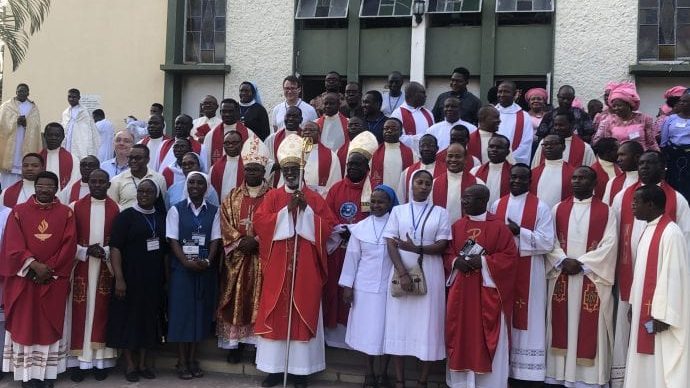A major African summit concluded on Sunday with a warning that despite the continent enjoying the Catholic Church’s highest growth rate, unless theology and pastoral practice is “translated into tools of liberation” then “the growth of the Church will only be in number.”
“The kingdom of God does not grow simply in number,” said the final outcome document of the Pan African Congress on Theology, Society, and Pastoral Life. “Rather, it grows in love, faith, and hope. This growth transforms communities, cultures and traditions.”
The three-page consensus document was drafted by a four-person committee of theologians and agreed upon by the 80 delegates that gathered at Bigard Memorial Seminary December 5-8 and called for concrete pathways “to realizing the dreams and hopes of our people” in hopes that Africa can become the “spiritual lung” of the Church and the world.
In a culture where some topics - such as sex, the role of women, and hierarchal structures - are often considered taboo, the document noted that the conference sought to be “inclusive of all voices” and called for a deeper theology to reflect that reality, especially in the African cultural context.
The document called for an embrace of the principle of subsidiarity in formulating and applying theology, noting that there could not be discussion of the role of women in the Church without their presence in the room or that of poverty without those who have experienced it.
“Subsidiarity equally applies to the diversity of human experiences today, particularly the forgotten and those at the margins whose lives have been framed by narratives of exclusion - sexual minorities, persons with disabilities, divorced and remarried, migrants, and refugees,” the document stated.
Further, the document called for a dialogical theology modeled after Pope Francis’s call for church leaders to “have the smell of the sheep,” with a mutual sharing of leadership within the Church and a rejection of “clerical, hierarchal, and patriarchal structures and systems.”
“We are committed to a transformative theological praxis of encounter, humility, and hope that shatters the boundaries of class, race, gender, nationality, creeds, and all exclusionary categories,” the document concluded.
The Congress was convened by the African Catholicism Project and marked the 50th anniversary of SECAM, the Symposium of Episcopal Conferences of Africa and Madagascar, and the 25th and 10th anniversaries, respectively, of the global synods on the Church in Africa. Going forward, participants agreed to meet every two years to assess the progress of the congress’s goals.
Dominican scholar, Father Iheanyi Enwerem, who served as the principal drafter of the document, told Crux that “our hope and dream” is for the document to be read, considered, and implemented throughout the continent, not merely by those who were present in Nigeria.
He added that delegates could not just rely on the bishops of Africa but must take into their own hands the task of implementing it. Borrowing a line from American politician Tip O’Neill that “all politics is local,” Enwerem said that “all theology is local,” emphasizing that it must take into consideration the local needs and realities.
Father Stan Chu Ilo, principal convener of the congress, said that such a document was incapable of saying everything that the delegates discussed or aspired to, but hoped that it would offer a “broad set of principles that offer our vision.”
He also noted that it should model an example of individuals with different backgrounds and perspectives without resulting in “an exchange of blows or warfare.”
Elizabeth Kamini, a Catholic peace activist from Kenya, concurred, saying that the congress could best be described as a family where “all those who are marginalized have had space to contribute.”
Similarly, Nigerian theologian Simon Aihiokhai, who is now an assistant professor of systematic theology at the University of Portland, Oregon, said that the highlight of the document is its dialogical approach that emphasizes the need to avoid “surface level conversation,” and instead, “to be in conversation with multiple partners.”
“The gift of self awareness comes with the encounter with the other,” he told Crux, adding that theological institutions in Africa must begin their perspective of the encounter with the other, “no matter how radically different or challenging it may be.”
“This is how we are going to eradicate theological, spiritual, and institutional tribalism. The cancer of Africa today is tribalism,” Aihiokhai added. “When we begin to do this theologically, we will be able to create a new vision of being a continent and of being a people…and heal wounds.”

